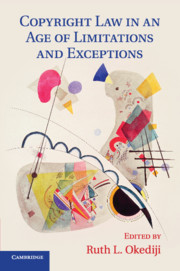Book contents
- Copyright Law in an Age of Limitations and Exceptions
- Copyright Law in an Age of Limitations and Exceptions
- Copyright page
- Dedication
- Contents
- Author Biographies
- Preface
- Introduction
- 1 Justifications for Copyright Limitations and Exceptions
- 2 The Role of the Author in Copyright*
- 3 A Few Observations about the State of Copyright Law
- 4 Fetishizing Copies
- 5 Copyright in a Digital Ecosystem
- 6 The Canadian Copyright Story
- 7 (When) Is Copyright Reform Possible?
- 8 Fair Use and Its Politics – at Home and Abroad
- 9 Flexible Copyright
- 10 The Limits of “Limitations and Exceptions” in Copyright Law
- 11 Lessons from CopyrightX
- 12 Rights on the Border: The Berne Convention and Neighbouring Rights
- 13 How Oracle Erred
- 14 Reframing International Copyright Limitations and Exceptions as Development Policy
- Index
7 - (When) Is Copyright Reform Possible?
Published online by Cambridge University Press: 07 June 2017
- Copyright Law in an Age of Limitations and Exceptions
- Copyright Law in an Age of Limitations and Exceptions
- Copyright page
- Dedication
- Contents
- Author Biographies
- Preface
- Introduction
- 1 Justifications for Copyright Limitations and Exceptions
- 2 The Role of the Author in Copyright*
- 3 A Few Observations about the State of Copyright Law
- 4 Fetishizing Copies
- 5 Copyright in a Digital Ecosystem
- 6 The Canadian Copyright Story
- 7 (When) Is Copyright Reform Possible?
- 8 Fair Use and Its Politics – at Home and Abroad
- 9 Flexible Copyright
- 10 The Limits of “Limitations and Exceptions” in Copyright Law
- 11 Lessons from CopyrightX
- 12 Rights on the Border: The Berne Convention and Neighbouring Rights
- 13 How Oracle Erred
- 14 Reframing International Copyright Limitations and Exceptions as Development Policy
- Index
Summary
Most discussions of the limitations on, and exceptions to, copyright start from an assumed set of malfunctions in the policy process. They include collective action problems, professional ideologies that are resistant to empirical evidence, “race to the top” effects in international political negotiations, the defensive reaction of incumbent industries to technological innovation, revolving doors and industry capture of the regulatory process, the unreflective imposition of ideas drawn from real property on the world of the intangible and many more. Those malfunctions have a disproportionate effect on attempts to set the boundaries of copyright more narrowly – whether in time, in scope, in the behavior that it regulates, or in the safe harbors that it protects.
This chapter explores a particular – albeit localized and partial – counterexample to the normal tale of the futility of reform; the Hargreaves Review of Intellectual Property, an independent review of the UK intellectual property system commissioned by the UK government in 2010. The Hargreaves Review was remarkable in that, in certain limited ways, it seemed to evade this tangle of regulatory malfunction in its assessments of the copyright system. More remarkable still, its policy proposals were – for the most part – concerned with limitations and exceptions to copyright, and most of them were actually enacted into law. In this chapter, I try to see if we can learn anything about copyright’s general state of regulatory impasse from this apparent partial counterexample.
- Type
- Chapter
- Information
- Copyright Law in an Age of Limitations and Exceptions , pp. 206 - 233Publisher: Cambridge University PressPrint publication year: 2017



